
Introduction
Healio CME sought to explore healthcare provider (HCP) needs and preferences regarding their CME habits, requirements and preferences.
Survey Methods
Healio CME created a 23-item survey that explored two primary areas of interest: (1) HCP usage patterns of earning CME credit; and (2) HCP preferences in CME activities, formats and features. This survey was hosted on the Qualtrics, LLC survey platform and digitally distributed. A total of 264 respondents met the eligibility requirements of a) being mandated to earning CME credits in their role as an HCP; and (b) completing at least one CME activity on Healio’s CME website within the past year.
Results
The profession and specialty of these 264 eligible HCP respondents are provided in the tables below. (NOTE: Seventeen of these eligible responders did not provide their medical specialty).
Professional Titles
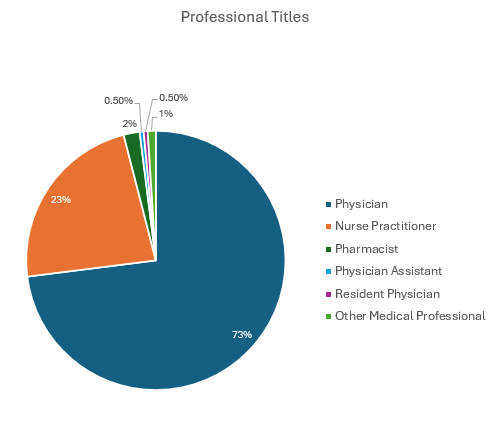
Specialties
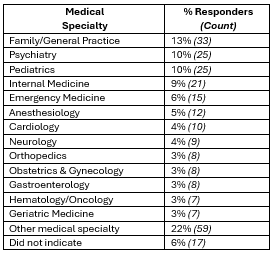
Most participants additionally indicated holding an active license in U.S. states of New York (15%; n = 39), California (13%; n = 35) and/or Florida (11%; n = 28). A complete listing of this collected demographic information is available upon request.
Total required credit hours: Required CME credits needed are reported in the below table. Half of these learners are earning at least four hours of CME per month. It should be noted that required credit amounts and schedule of license renewal differ across the U.S. state of active license, professional title and medical specialty.
Total Required Credit Hours
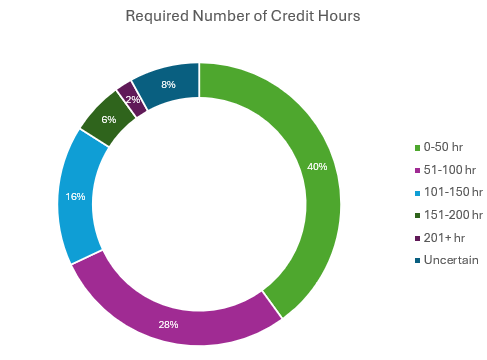
Frequency of progress monitoring: Variability in the required timing of credit reporting was observed among respondents as indicated in the table below. Again, differing medical specialties across differing U.S. states undergo license renewal with asynchronous cycles (e.g., some renew every year, others renew every five years).
Frequency of Progress Monitoring
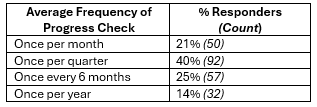
Specific timing of credit-earning: Time of day and day of week preferences for obtaining credit are indicated below. Evening hours are most used for obtaining credits, though no clear preference for weekday vs. weekend hours was observed.
Specific Timing of Credit-Earning
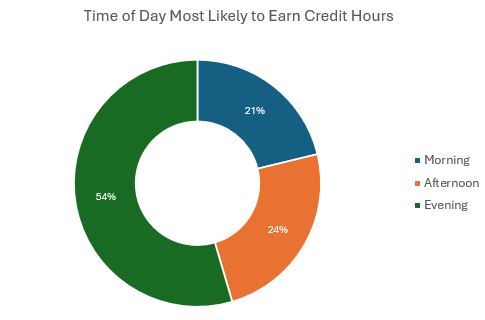
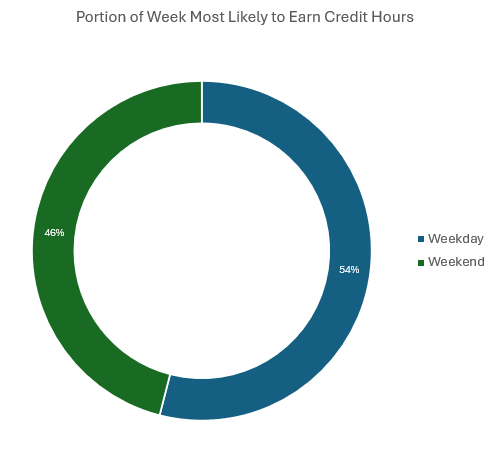
Devices used to complete online activities: Most respondents (67%) preferred to access credits via an online platform, with fewer preferring annual society meetings (18%) or other live courses (15%). Devices used to participate in activities is provided below:
Devices Used to Complete Online Activities
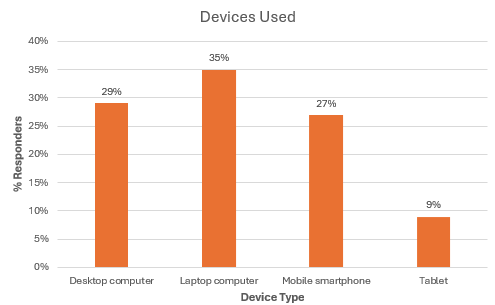
With specific regard to online platforms, case-based activities were preferred, with complete preference provided below:
Preferred Sources and Formats of CME Credit
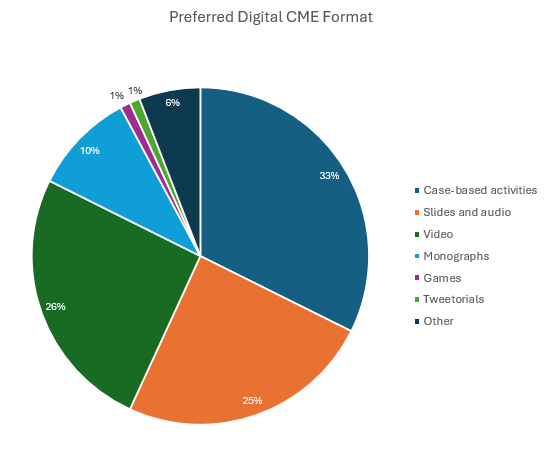
Prioritization of activity features: Via drag-and-drop format from 1 (Most prioritized) to 8 (Least prioritized), HCP respondents reported most highly prioritizing an activity’s relevant discipline/specialty (average score = 3.11), and least prioritizing the recency of an activity’s publication date (average score = 6.57). All prioritization placement results are shown below:
Prioritization of Activity Features
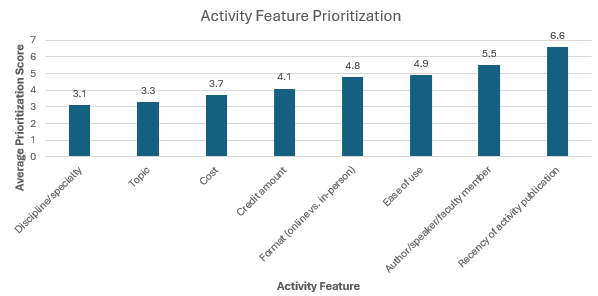
Naming the biggest challenge: In a final, open-ended item, participants clearly indicated that the greatest challenge they face in earning CME credit is a constraint of time. The 237 open-ended text responses on this item were categorized by theme and counted in descending order, as shown above. Response themes were not mutually exclusive.
Most Significant Challenges
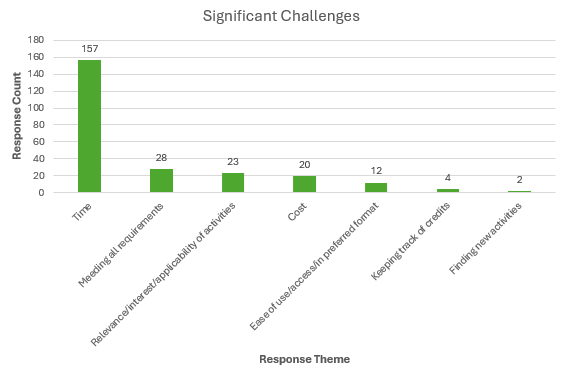
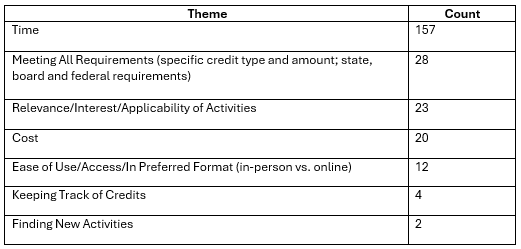
Conclusion and Future Directions
In a highly demanding healthcare environment with limiting time constraints for providers, results from this survey demonstrated that successful, effective dissemination of educational materials for HCPs requires a substantive understanding of how HCPs functionally approach the CME process. In general, survey results revealed that the average HCP is most likely to attend to CME activities in their after-hours time on weekdays; they are further most likely to seek case-based activities, summary slides and audio/video formats of digital CME content, most highly prioritizing topical relevance to their specialty over, for example, “newness” of an activity’s availability. Knowing these patterns and preferences provides user-driven direction to the medical education industry to best meet HCP needs.
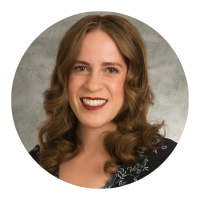 Sarah Caputo, MS, is research manager for Healio and Healio CME.
Sarah Caputo, MS, is research manager for Healio and Healio CME.
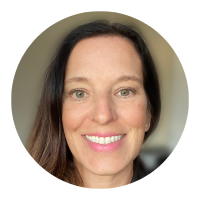 Andrea Gaymon, MEd, is chief experience officer for Healio overseeing product development, research and delivery.
Andrea Gaymon, MEd, is chief experience officer for Healio overseeing product development, research and delivery.
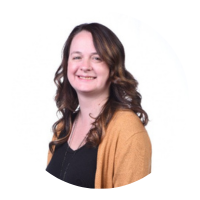 Amber Cox is director of operations for Healio CME overseeing program management and execution.
Amber Cox is director of operations for Healio CME overseeing program management and execution.